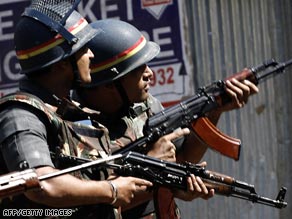What we know about the Mumbai attacks
- Story Highlights
- Gunmen arrived by boats, split into at least three groups, authorities say
- British authorities: Indian navy probing ship where boats may have originated
- More than 120 people killed in Mumbai attacks since Wednesday
- Gunmen still believed to be in two hotels, Jewish residence on Friday morning
- Next Article in World »
(CNN) -- Gunmen who arrived by boats launched attacks on at least seven locations in Mumbai, India, on Wednesday night, killing more than 120 people, authorities say.

Indian soldiers take position outside Chabad House, the scene of one the Mumbai attacks.
By Friday morning, authorities believed militants still were in two luxury hotels and a Jewish center in the city.
The following is what is known about the attacks:
• Gunmen arrived by boats at the Mumbai waterfront near the Gateway of India monument on Wednesday night, police said. The gunmen hijacked cars, including a police van, and split into at least three groups to carry out the attacks, according to police.
• One group headed toward the Cafe Leopold, a popular hangout for Western tourists, firing indiscriminately at passers-by on the street. The group then opened fire and lobbed grenades at the Chhatrapati Shivaji Terminus railway station, authorities said.
• As police rushed to the scene of the attacks, gunmen attacked the Cama Hospital for women and infants. Several people were killed at the hospital, and a standoff there lasted until Thursday morning.
• Two other groups attacked the Oberoi and Taj Mahal hotels, taking hostages there, police said.
• Gunmen also took hostages at the Chabad House, where several Jewish families live, police said. Rabbi Gavriel Holtzberg, the city's envoy for the community, was being held inside with his wife, a member of the Hasidic Jewish movement said. Gunmen and hostages still were believed to be in the house Friday morning.
International hot lines
Australia: Department of Foreign Affairs offers these numbers: In Australia: 1-800-002 214. Australians overseas, call 61 2 6261-3305.India: JJ Hospital, 91 22 2373-5555; St. George Hospital (Dr. Ashok Shinde), 91 98 6905-0622; Police control room, 91 22 2262-5020, 91 22 2262-1855
UK: The British Ministry of Foreign Affairs is directing concerned UK nationals to call 44 (0)20 7008-0000
U.S.: The State Department has established a Consular Call Center: The number is 888-407-4747.
Canada:
For Canadians in India call 1-800-387-3124. In Canada call 613-996-8885.
• Police said gunmen fired indiscriminately from the Chabad House. Stray bullets killed a couple in their home and a 16-year-old boy who stepped outside, police said. Two women and a child escaped from the building Thursday, a government official says.
• At the hotels, hostages or people who were trapped left at various times Thursday and Friday. Commandos entered both hotels, trying to flush out militants and rescue others.
• By 12:30 a.m. IT on Friday, two gunmen remained at the Oberoi hotel, the director-general of the National Security Guards said. At 1 a.m., one gunman was killed at the Oberoi hotel, the official said. He said he couldn't say for sure how many gunmen were still at the Oberoi.
• Early Friday, an Indian general told reporters that two or three gunmen, one of whom was wounded, remained inside the Taj hotel.
• An undetermined number of nonmilitants remained inside the hotels Friday morning, NSG director-general J.K. Dutt said. "There are some of them inside the rooms, and they are not prepared to open the doors," he said. "Probably they are fearing that it might not be an innocent."
• Fire brigades battled fires at both hotels. By early Friday, it appeared what had been a major fire at the Oberoi had been extinguished.
• By Friday morning, 125 had been killed in the attacks, including at least six foreigners, authorities said. An Italian and a Briton were among the confirmed dead. Another 327 people were wounded, including seven Britons, three Americans and two Australians. ![]() Watch theories on who may have carried out the attacks »
Watch theories on who may have carried out the attacks »
• At least nine gunmen were killed in fighting with police by Friday morning. Also among the dead were 14 police officers and the chief of the Mumbai police anti-terror squad.
• CNN's sister network in India, CNN-IBN, quoted police sources as saying there were about 26 gunmen.
Don't Miss

• Authorities found 8 kilograms (17 pounds) of RDX, one of the most powerful kinds of military explosives, at a restaurant near the Taj, indicating that the attackers may have been planning more violence.
• The Indian navy, stepping up patrols on the country's western coast after the attack, was questioning the crew of the MV Alpha, a ship detained with the help of the Indian coast guard, British authorities said. The authorities said they believe the attackers' boats came from this ship, and that they believe the ship is from Karachi, Pakistan.
• Karachi police say they have no evidence the attackers departed from their city.
• Several Indian news outlets report a group called the Deccan Mujahideen e-mailed them to claim responsibility. Intelligence officials say little is known about the group. U.S. officials and security analysts say the sophistication of the attacks may indicate a more-established group is responsible.
• State media Press Trust of India, citing Union Cabinet Minister Kapil Sibal, reported the gunmen had worked for months to prepare, even setting up "control rooms" in the two luxury hotels that were targeted.

 Sit tight, we're getting to the good stuff
Sit tight, we're getting to the good stuff